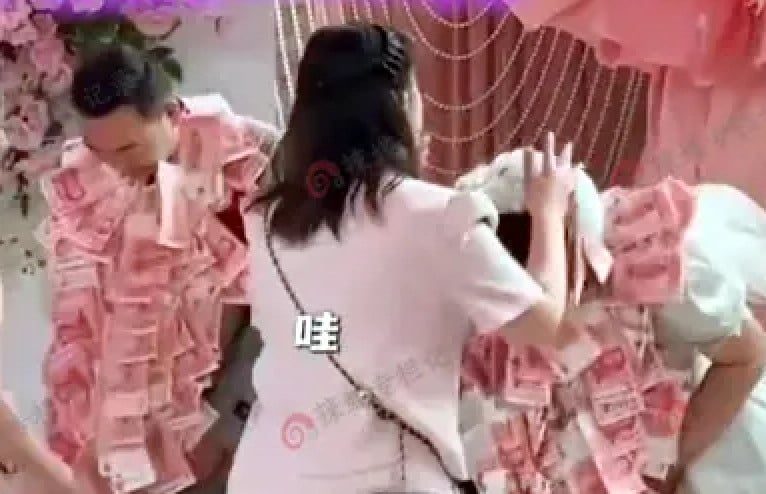
China groom lavished with garlands of money worth US$22,000, underscores cultural bias for sons
- Only-son groom showered with cash, indulged by siblings on wedding day
A bride and groom in China have received generous money garlands worth a total of 160,000 yuan (US$22,000) on their wedding day from the man’s eight elder sisters and their husbands.
The nuptials were held on May 15 in Shiyan of Hubei province, central China, Feidian Video reported.
A clip showing the couple standing on stage while the groom’s sisters and brothers-in-law take turns placing wreaths comprising multiple 100 yuan notes around the newlyweds’ necks, went viral on mainland social media.
Footage shows the sisters giving the cash-decorated garlands to the bride, while the brother-in-laws do the same for the groom, as the couple bow towards their relatives in a gesture of gratitude.
“The garlands are too heavy for their necks. This is such an enviable custom, haha,” the guest who shot the video said on Douyin.

She said the groom’s parents had passed away and his sisters always indulged him, and that his brothers-in-law are wealthy. They funded the wedding, she said.
“Giving him money is the most direct way to support him. The sisters thought of the garland idea but kept it as a surprise,” the female guest said.
The wedding ceremony launched widespread discussion on mainland social media, putting the country’s traditional preference for boys over girls at the centre.
The groom’s parents appear to have hoped to have a son because they continued having children until that was achieved.
It was once common practice for families in China to name their daughters zhao di, which means “bringing a younger brother”.
When a son was born, he would often be called yao zu, which means “honouring the ancestor”.
From childhood, elder sisters were taught by their parents that they should do their best to help, or even make sacrifices for, the younger brother.

As a result, such women were given the nickname “monster of helping younger brother” on mainland social media.
Although the preference for boys has declined in recent years, especially in big cities, the tradition still exists.
In 2022, for every 100 newborn girls, there were 111.1 baby boys across the country, according to the national health authority. This is higher than the global average ratio of about 106.
“If this bride cannot give birth to a boy in the future, will she live a miserable life in an uncomfortable family atmosphere?” one person asked on Douyin.
“I frown on this attitude. I think this family values the male offspring too much and that is unfair to their sisters. I don’t agree with the view,” said another.

